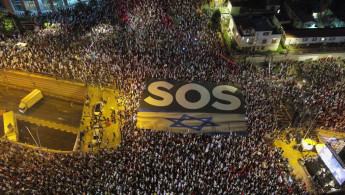Israelis continue protests as judicial reform advances
Tens of thousands of Israeli protesters took to the streets of Tel Aviv and elsewhere Saturday protesting reforms advanced by the coalition they say threaten the country's democratic character.
Saturday's rallies, the 28th since the reform agenda was unveiled in January, come days after parliament approved in its first reading a bill that would reduce the "reasonability" clause, through which the judiciary can strike down government decisions.
The proposals would also give the government a greater say in the appointment of judges.
"This is a battle for the country, we want to keep Israel democratic, and the dictatorship laws won't pass here," protester Nili Elezra, 54, told AFP.
To her, passing the laws would harm Israel's financial and global standings.
"Things will be bad. People are already leaving, money is being lost, investors are fleeing, the world doesn't want to talk to us, nobody is happy with what's going on here," she said.
Following stiff opposition and growing international criticism -- including from US President Joe Biden -- Prime Minister Benjamin Netanyahu ordered a "pause" in March to allow for talks on the proposals.
That cross-party dialogue collapsed last month.
To Elad Ziv, the upcoming weeks were crucial in stopping the legal reform.
"We have two and a half weeks to the end of parliament's summer session and we have to block them, otherwise Israel will become a worse place," the 45-year-old programmer told AFP.
And while the weekly demonstrations did not seem to hamper the coalition's legislation, they did afford support to members of the technology sector and military reservists opposing the government's ambitions.
"We do see the protest working in supporting people who are fighting," he said.
"The numbers make a difference."





 Follow the Middle East's top stories in English at The New Arab on Google News
Follow the Middle East's top stories in English at The New Arab on Google News


